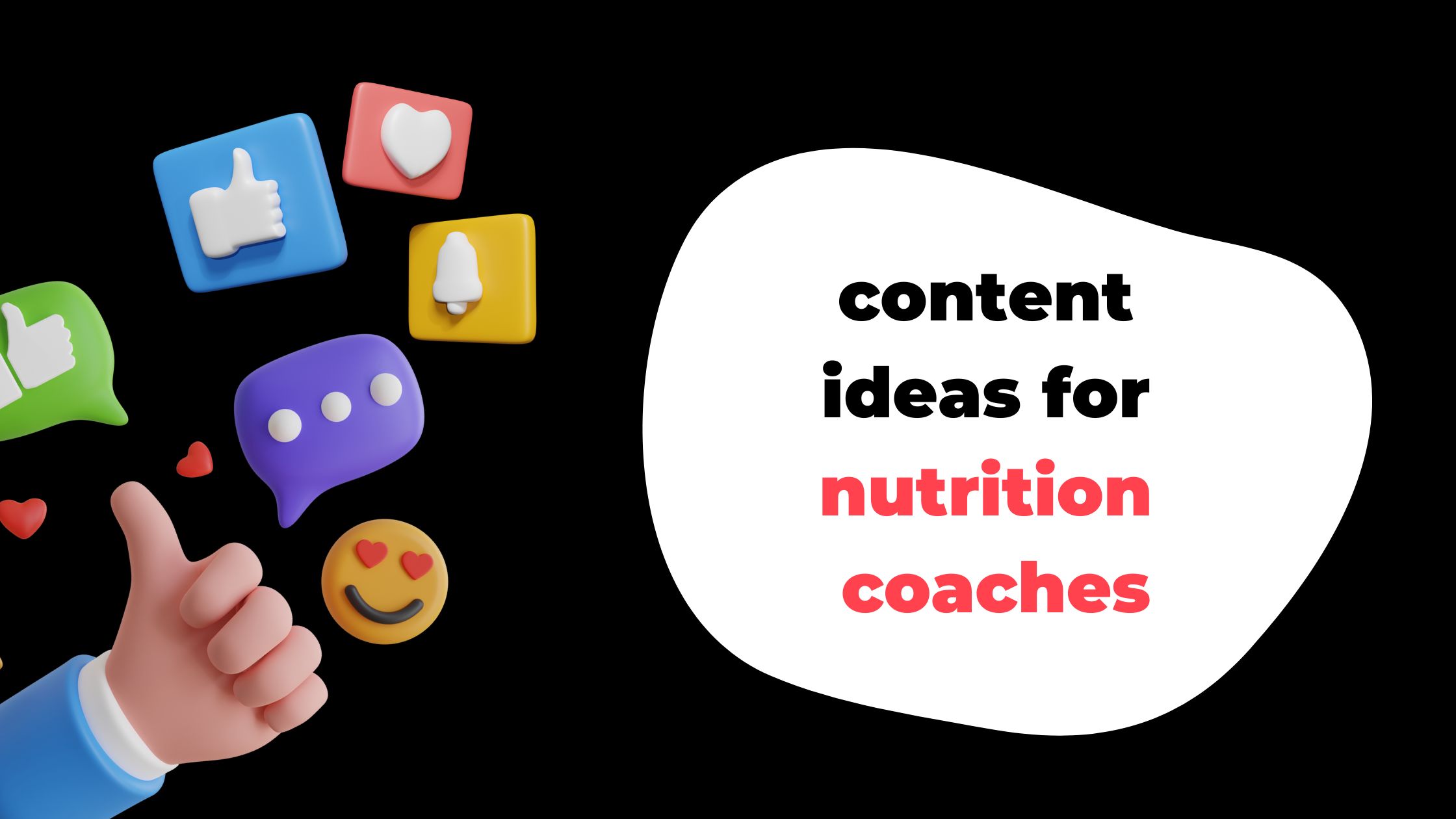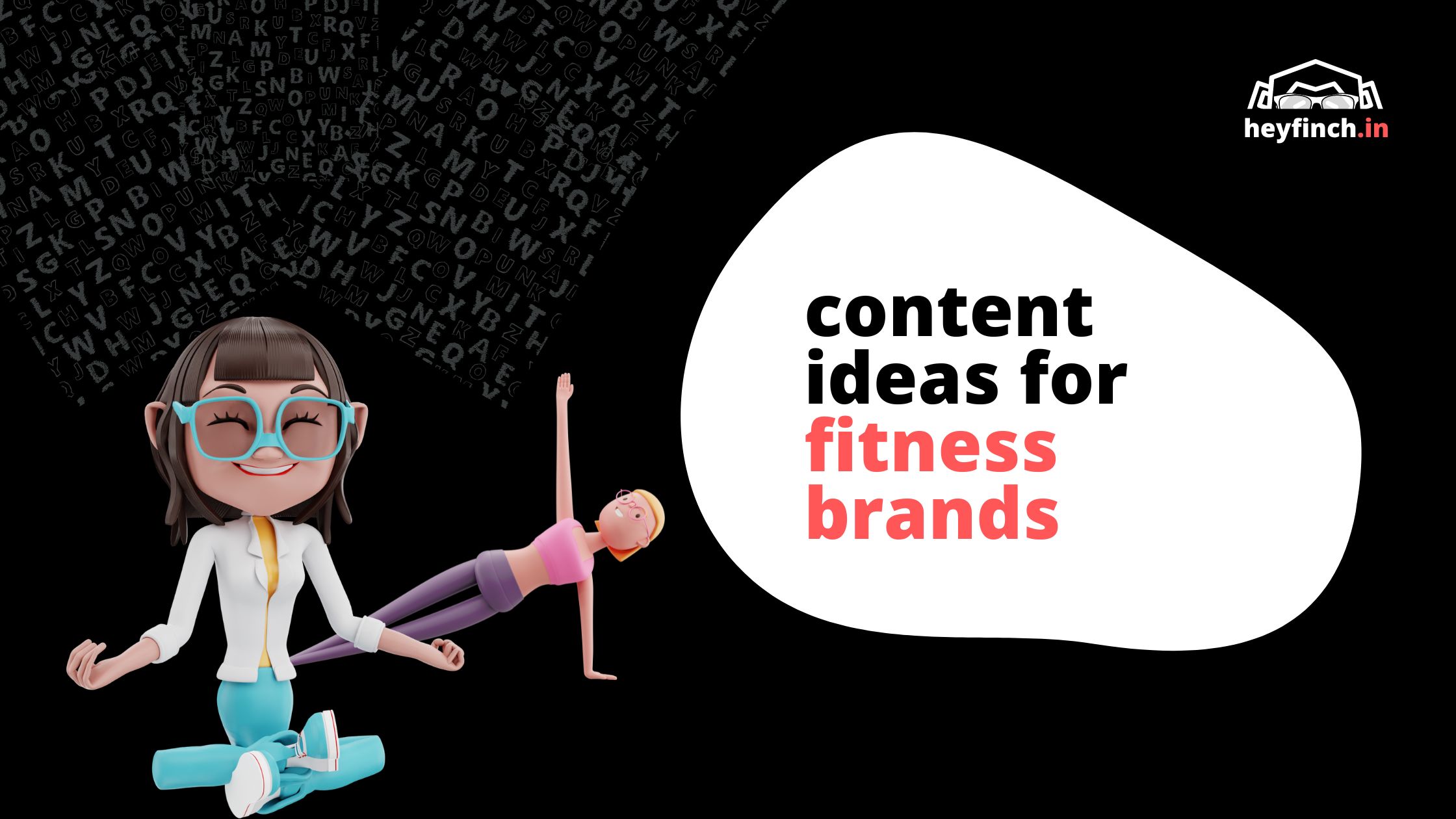100+ Content Ideas for Nutritional Coaching Business

Hey there, nutrition enthusiasts and aspiring health gurus! Are you searching for a smorgasbord of content ideas to nourish your nutritional coaching business and inspire your clients to embrace a healthy lifestyle? Well, you've come to the right place!
In this blog post, we've curated over 100 delectable content ideas that will satisfy even the most discerning palate. Get ready to spice up your nutrition coaching game and leave a lasting impact on your clients' well-being.
Get ready to inspire, educate, and nourish your clients as they embrace a healthier, happier lifestyle. Let's dig in and serve up content that will leave a lasting, positive impact on their well-being. Bon appétit!
Table of Contents
- YouTube Content Ideas for Nutritional Coaching
- Instagram Content Ideas for Nutritional Coaching
- Idea 1: "Nutrition 101: Building a Foundation for Healthy Eating"
- Idea 2: "Meal Prep Made Easy: Planning and Preparing Nutritious Meals"
- Idea 3: "Ingredient Spotlight: Superfoods and their Benefits"
- Idea 4: "Nutrition Myth Busters"
- Idea 5: "Healthy Recipe Remakes: Nutritious and Delicious Alternatives"
- Idea 6: "Nutrition Q&A: Expert Answers to Your Burning Questions"
- Idea 7: "Nutrition Education Series: Dive Deeper into Dietary Topics"
- Idea 8: "Nutrition and Wellness Quotes"
- Idea 9: "Nutrition Tips for Specific Goals or Lifestyles"
- Idea 10: "Nutrition Myth vs. Fact"
- LinkedIn Content Ideas for Nutritional Coaching
- Social Media Content Ideas for Nutritional Coaching
- Blog Content Ideas for Nutritional Coaching
- TikTok Content Ideas for Nutritional Coaching
- Email Content Ideas for Nutritional Coaching
- Video Content Ideas for Nutritional Coaching
- Evergreen Content Ideas for Nutritional Coaching
- Podcast Content Ideas for Nutritional Coaching
YouTube Content Ideas for Nutritional Coaching
Content Idea: "Healthy Recipe Makeovers: Reinventing Classic Dishes" Example: Show viewers how to transform popular recipes into healthier versions, demonstrating ingredient swaps and cooking techniques that enhance nutrition without compromising taste.
Content Idea: "Grocery Haul and Meal Prep: Plan for a Week of Healthy Eating" Example: Take viewers along on a grocery store trip, explaining how to make smart food choices and then showcase the meal prep process, providing insights into efficient planning and preparation for nutritious meals throughout the week.
Content Idea: "Fitness Fuel: Pre and Post-Workout Nutrition" Example: Discuss the importance of pre- and post-workout nutrition, explaining what to eat before and after exercise to optimize performance, support recovery, and achieve fitness goals.
Content Idea: "Kitchen Hacks for Healthy Cooking: Time-Saving Tips" Example: Share practical kitchen hacks, such as meal planning strategies, batch cooking techniques, and quick recipe ideas, to help viewers save time while preparing nutritious meals.
Content Idea: "Dietary Guidelines Decoded: Understanding Nutritional Recommendations" Example: Break down and explain official dietary guidelines, discussing the recommended daily intakes of various nutrients, portion sizes, and tips for meeting nutritional needs.
Content Idea: "Nutrition Mythbusters: Separating Fact from Fiction" Example: Debunk common nutrition myths by providing evidence-based facts, conducting deep dives into popular misconceptions, and offering scientifically supported explanations.
Content Idea: "Nutrition Education Series: Exploring Specific Diets and Eating Patterns" Example: Create a series of videos exploring different diets, such as Mediterranean, vegetarian, or low-carb, delving into their principles, health benefits, and tips for incorporating them into everyday life.
Content Idea: "Kitchen Pantry Tour: Stocking Nutrient-Rich Ingredients" Example: Take viewers on a tour of your pantry, sharing the essential nutrient-rich ingredients that should be staples for a healthy kitchen, explaining their benefits and versatility.
Content Idea: "Healthy Eating on a Budget: Thrifty Tips and Meal Ideas" Example: Provide practical advice on how to eat healthily while on a budget, including tips for affordable shopping, meal planning, and budget-friendly recipe ideas that don't compromise nutrition.
Content Idea: "Q&A with a Nutritionist: Answering Viewers' Questions" Example: Create a series of Q&A videos where you answer nutrition-related questions submitted by viewers, providing expert advice, addressing common concerns, and offering practical tips.
Remember to create visually appealing videos with clear explanations and demonstrations. Incorporate engaging visuals, such as recipe montages, graphics, and animations, to enhance the viewer's experience. Provide accurate information, cite credible sources, and encourage viewers to consult with healthcare professionals for personalized advice.
Instagram Content Ideas for Nutritional Coaching
Idea 1: "Nutrition 101: Building a Foundation for Healthy Eating"
Share fundamental principles of nutrition on Instagram to educate your audience about the basics of healthy eating and guide them towards making better dietary choices.
Example: Create carousel posts or infographics that cover topics such as macronutrients (carbohydrates, proteins, and fats), portion control, balanced meals, and the importance of hydration. Provide simple and practical tips for incorporating these principles into daily life.
Next Steps: Prepare visually appealing graphics or carousel posts that effectively communicate the nutrition fundamentals. Write concise and informative captions that break down complex concepts into easily digestible information. Publish the posts on Instagram and encourage followers to engage by asking questions or sharing their own experiences with implementing healthy eating habits.
Idea 2: "Meal Prep Made Easy: Planning and Preparing Nutritious Meals"
Description: Provide guidance and inspiration for meal prepping on Instagram, helping your audience save time and make healthier food choices throughout the week.
Example: Create posts featuring meal prep ideas, including a variety of balanced meals, snacks, and quick grab-and-go options. Showcase colorful photos of prepped meals, list the ingredients used, and provide step-by-step instructions for preparing and storing the meals. Offer tips for efficient meal prepping and emphasize the benefits of having nutritious options readily available.
Next Steps: Plan a collection of meal prep ideas, considering different dietary preferences and restrictions. Prepare and photograph the meals, ensuring they are visually appealing. Write detailed captions that explain the meal prep process and provide tips for successful implementation. Publish the posts on Instagram and engage with your followers by responding to comments and offering personalized meal prep advice.
Idea 3: "Ingredient Spotlight: Superfoods and their Benefits"
Description: Educate your audience about nutrient-dense superfoods and their potential health benefits through engaging Instagram posts.
Example: Create posts highlighting different superfoods such as kale, quinoa, chia seeds, turmeric, or blueberries. Include visually appealing photos of the superfood, provide a brief description of its nutritional profile, and explain how it can positively impact health. Share recipe suggestions or creative ways to incorporate the superfood into everyday meals.
Next Steps: Research a variety of superfoods and their benefits. Collect or create high-quality photos of each superfood. Write informative captions that present the nutritional value and potential health benefits. Publish the posts on Instagram, encourage followers to share their favorite superfood recipes or experiences, and provide additional resources or recommendations for further exploration.
Idea 4: "Nutrition Myth Busters"
Description: Debunk common nutrition myths and misconceptions on Instagram to provide your followers with accurate information and dispel any confusion surrounding dietary choices.
Example: Create carousel posts or infographics that address myths such as "carbohydrates are bad for you" or "eating after 8 PM leads to weight gain." Explain the scientific evidence and research that debunk these myths and provide alternative perspectives backed by credible sources.
Next Steps: Research common nutrition myths and misconceptions. Design visually appealing graphics or carousel posts that effectively convey the debunked information. Write clear and concise captions that present the facts and evidence. Publish the posts on Instagram, encourage followers to save and share the content, and engage in conversations by answering questions and addressing concerns.
Idea 5: "Healthy Recipe Remakes: Nutritious and Delicious Alternatives"
Description: Share Instagram posts featuring healthier versions of popular recipes, offering alternatives that align with specific dietary needs or goals.
Example: Create posts showcasing recipes for healthier versions of comfort foods, desserts, or snacks. Substitute ingredients with healthier alternatives and explain their nutritional benefits. Include step-by-step instructions and vibrant photos of the finished dishes.
Next Steps: Select popular recipes to recreate with healthier ingredients. Prepare the dishes, ensuring they are visually appealing and appetizing. Photograph each step of the cooking process and the final results. Write detailed captions that outline the healthier substitutions and explain the benefits. Publish the posts on Instagram and engage with your followers by responding to comments and offering variations or tips for customization.
Idea 6: "Nutrition Q&A: Expert Answers to Your Burning Questions"
Description: Host a live or recorded Q&A session on Instagram where you address your audience's nutrition-related questions and provide expert advice. Cover a range of topics such as meal planning, dietary restrictions, weight management, and more.
Example: Ask your audience to submit their questions in advance or during a live session using a specific hashtag. Select a variety of questions that represent common concerns or interests. Answer each question in detail, providing evidence-based information and practical tips. Consider featuring guest experts for specific topics to add depth and credibility to the Q&A session.
Next Steps: Promote the upcoming Q&A session across your Instagram account and other social media platforms. Decide whether it will be a live session or a pre-recorded video. Set a specific date and time for the session and encourage followers to submit their questions. Prepare well-researched responses and address each question in a clear and informative manner. Publish the Q&A session on Instagram, engage with your audience through comments, and offer additional resources or recommendations as needed.
Idea 7: "Nutrition Education Series: Dive Deeper into Dietary Topics"
Description: Create an Instagram series that delves into specific nutrition-related topics, providing your audience with in-depth knowledge and practical tips.
Example: Identify various nutrition topics such as mindful eating, gut health, intuitive eating, or managing macros. Create a series of posts, each dedicated to a different topic, providing detailed explanations, practical strategies, and actionable advice. Use a combination of visually appealing graphics, carousel posts, and informative captions to communicate the information effectively.
Next Steps: Plan the nutrition topics you want to cover in the series. Research each topic thoroughly to ensure accurate information. Design engaging graphics or carousel posts that align with the topic. Write informative captions that present the key points and offer practical tips or suggestions. Publish the posts on Instagram, encourage followers to engage through comments or direct messages, and consider compiling the series into a highlight on your Instagram profile for easy access.
Idea 8: "Nutrition and Wellness Quotes"
Description: Share inspiring and motivational quotes related to nutrition, wellness, and self-care on Instagram to uplift and encourage your followers.
Example: Design visually appealing quote graphics using popular quotes from nutritionists, wellness experts, or philosophers. Select quotes that align with your philosophy and resonate with your audience. Incorporate relevant imagery or backgrounds to enhance the visual impact of each quote.
Next Steps: Compile a list of inspiring and uplifting quotes related to nutrition and wellness. Design eye-catching quote graphics using suitable templates or image editing tools. Write brief and engaging captions to accompany each quote. Publish the posts on Instagram and encourage followers to engage by sharing their favorite quotes or tagging friends who may benefit from the message.
Idea 9: "Nutrition Tips for Specific Goals or Lifestyles"
Description: Share Instagram posts that provide tailored nutrition tips and guidance for specific goals or lifestyles, such as weight loss, muscle building, vegetarian or vegan diets, or dietary considerations for athletes.
Example: Create posts that address the unique nutritional requirements and considerations for individuals with specific goals or lifestyles. Offer tips for optimizing nutrient intake, overcoming common challenges, and maintaining a healthy balance. Provide practical suggestions for meal planning, grocery shopping, and supplementation.
Next Steps: Identify specific goals or lifestyles that you want to focus on. Conduct research to gather accurate and relevant information. Design visually appealing graphics or carousel posts that effectively communicate the tips and suggestions. Write detailed captions that provide context and explain the rationale behind each recommendation. Publish the posts on Instagram, encourage followers to engage through comments or direct messages, and address any questions or concerns they may have.
Idea 10: "Nutrition Myth vs. Fact"
Description: Share Instagram posts that debunk common nutrition myths and present evidence-based facts to help your audience make informed dietary choices.
Example: Create carousel posts or infographics that present a nutrition myth on one side and the corresponding fact on the other. Explain the scientific evidence that supports the fact and dispels the myth. Use visually engaging graphics or illustrations to highlight the contrast between the myth and the fact.
Next Steps: Research common nutrition myths and corresponding facts. Design visually appealing graphics or carousel posts that effectively convey the information. Write concise captions that present the myth, provide the fact, and offer additional explanations or context. Publish the posts on Instagram, encourage followers to save and share the content, and engage in conversations by answering questions and addressing concerns.
LinkedIn Content Ideas for Nutritional Coaching
Content Idea: "Top 5 Nutrition Tips for Optimal Workplace Productivity" Example: Share practical advice on how professionals can fuel their bodies with the right nutrients to enhance focus, energy, and productivity during work hours.
Content Idea: "Navigating Nutritional Challenges When Traveling for Business" Example: Provide strategies for maintaining a healthy diet and making smart food choices while traveling for work, including tips for airport meals, hotel dining, and managing time zone differences.
Content Idea: "Building a Healthy Company Culture: The Role of Nutrition" Example: Discuss the impact of nutrition on employee well-being, morale, and productivity. Offer insights on how companies can promote healthy eating habits and provide resources for their workforce.
Content Idea: "Understanding Nutritional Labels: Decoding Food Packaging" Example: Break down the components of food labels and guide professionals in making informed decisions by understanding serving sizes, reading ingredient lists, and interpreting nutrition facts.
Content Idea: "Nutrition for Peak Performance: Fueling Your Career Success" Example: Explore the link between nutrition, mental clarity, and professional performance. Highlight specific foods and nutrients that support cognitive function, stress management, and overall well-being.
Content Idea: "Dietary Considerations for Busy Professionals: Balancing Health and Time Constraints" Example: Provide practical tips and meal planning strategies for professionals with demanding schedules, emphasizing the importance of nourishing meals despite time limitations.
Content Idea: "Nutrition and Work-Life Integration: Prioritizing Self-Care for Career Success" Example: Discuss the significance of self-care, including proper nutrition, in maintaining work-life balance and avoiding burnout. Share insights on incorporating healthy habits into busy work schedules.
Content Idea: "Nutrition for Entrepreneurs: Fueling Innovation and Business Success" Example: Explore the role of nutrition in supporting the mental and physical well-being of entrepreneurs. Discuss foods and dietary patterns that can enhance creativity, focus, and sustainable energy levels.
Content Idea: "Managing Stress Eating: Healthy Coping Strategies for Professionals" Example: Address the common issue of stress-induced eating in the workplace. Offer practical tips and healthier alternatives to manage stress and emotional eating habits.
Content Idea: "The Importance of Nutrition Education in the Workplace" Example: Advocate for incorporating nutrition education programs in corporate wellness initiatives. Discuss the benefits of educating employees on proper nutrition and its impact on overall health and job performance.
Social Media Content Ideas for Nutritional Coaching
Content Idea: "Quick and Healthy Breakfast Ideas to Start Your Day Right" Example: Share simple and nutritious breakfast recipes that can be prepared in a short amount of time, providing a boost of energy and setting a positive tone for the day.
Content Idea: "Snack Smart: Healthy and Convenient Options for On-the-Go" Example: Showcase a variety of healthy snack ideas that are portable, easy to prepare, and satisfy cravings without compromising nutritional goals.
Content Idea: "Ingredient Spotlight: Superfoods and Their Benefits" Example: Highlight different superfoods and explain their unique nutritional benefits, along with suggestions on how to incorporate them into meals and snacks.
Content Idea: "Nutrition Myth vs. Fact: Debunking Common Misconceptions" Example: Bust popular nutrition myths and provide evidence-based facts to help your audience make informed choices about their diet and well-being.
Content Idea: "Weekly Meal Prep: Simplify Healthy Eating with Pre-Planned Meals" Example: Offer meal prepping tips, including batch cooking, portion control, and storage ideas, to help followers save time and stay on track with their nutritional goals.
Content Idea: "The Power of Hydration: Importance and Tips for Staying Hydrated" Example: Educate your audience about the benefits of proper hydration and provide practical tips on how to increase water intake throughout the day.
Content Idea: "Nutrition for Exercise: Fueling Your Workouts for Optimal Performance" Example: Share advice on pre- and post-workout nutrition, including the importance of macronutrients, hydration, and timing of meals, to support fitness goals.
Content Idea: "Cooking Demos: Nutritious Recipes Made Simple" Example: Film short cooking demos where you prepare healthy and delicious recipes, providing step-by-step instructions and nutritional insights.
Content Idea: "Ask the Nutritionist: Live Q&A Sessions with Expert Advice" Example: Host live Q&A sessions on social media platforms, where followers can submit their nutrition-related questions and receive personalized advice and guidance.
Content Idea: "Client Success Stories: Celebrating Health and Well-being Milestones" Example: Feature success stories of your clients who have achieved their health and wellness goals through proper nutrition, inspiring your audience and showcasing the transformative power of a balanced diet.
Blog Content Ideas for Nutritional Coaching
Blog Idea: "The Beginner's Guide to Healthy Eating: Tips and Strategies" Example: Provide a comprehensive guide for beginners on adopting a healthy eating lifestyle, including tips on meal planning, grocery shopping, label reading, and portion control.
Blog Idea: "Understanding Macronutrients: Carbohydrates, Proteins, and Fats" Example: Break down the three macronutrients, explaining their roles in the body, optimal intake, and sources of each nutrient. Offer practical advice on balancing macros for different dietary goals.
Blog Idea: "Nutrition for Mental Health: The Gut-Brain Connection" Example: Explore the link between nutrition and mental health, emphasizing the role of a healthy gut in supporting emotional well-being. Discuss foods that promote a healthy gut microbiome and support mental wellness.
Blog Idea: "Superfoods for Optimal Nutrition and Well-being" Example: Highlight a selection of superfoods, discussing their nutritional profiles, health benefits, and ways to incorporate them into everyday meals. Provide recipe ideas and tips for maximizing their nutritional value.
Blog Idea: "Eating for Energy: Nutritional Strategies to Boost Productivity" Example: Share dietary recommendations and specific foods that provide sustainable energy levels throughout the day. Discuss the importance of meal timing, nutrient balance, and hydration for optimal productivity.
Blog Idea: "Navigating Nutrition Labels: Decoding Food Packaging" Example: Provide guidance on understanding and interpreting nutrition labels, explaining common terms, serving sizes, and hidden ingredients. Help readers make informed choices while grocery shopping.
Blog Idea: "Plant-Based Nutrition: Benefits, Tips, and Recipe Ideas" Example: Dive into the world of plant-based nutrition, discussing the benefits of a plant-focused diet, nutrient considerations, and providing recipe ideas for those interested in incorporating more plant-based meals.
Blog Idea: "Nutrition for Active Lifestyles: Fueling Workouts and Recovery" Example: Offer insights into pre- and post-workout nutrition, discussing the importance of macronutrients, hydration, and timing of meals for optimizing performance and supporting recovery.
Blog Idea: "Eating Well on a Budget: Nutritious and Affordable Meal Ideas" Example: Share practical tips for eating healthy on a budget, including cost-saving strategies, shopping smart, and providing affordable meal ideas that are nutritious and delicious.
Blog Idea: "Customizing Nutrition for Specific Dietary Needs: Gluten-Free, Dairy-Free, and More" Example: Provide guidance for individuals with specific dietary needs or restrictions, such as gluten-free, dairy-free, or vegan diets. Offer insights on nutrient considerations, potential challenges, and practical tips for success.
TikTok Content Ideas for Nutritional Coaching
Content Idea: "Quick and Easy Healthy Recipe Tutorials" Example: Create short, fast-paced recipe videos that showcase nutritious meals or snacks that can be prepared in under a minute, demonstrating simple step-by-step instructions.
Content Idea: "Myth vs. Fact: Debunking Nutrition Misconceptions" Example: Use TikTok's split-screen feature to compare common nutrition myths with evidence-based facts, providing bite-sized explanations and captivating visuals.
Content Idea: "Ingredient Hacks: Healthier Swaps and Substitutions" Example: Share creative ways to make healthier ingredient substitutions in popular recipes, such as using Greek yogurt instead of mayonnaise or cauliflower rice instead of white rice.
Content Idea: "Meal Prep Tips and Tricks" Example: Share time-saving meal prep hacks and ideas that help viewers plan and prepare nutritious meals in advance, showcasing how to save both time and effort.
Content Idea: "Nutrition in 60 Seconds: Bite-Sized Nutrition Tips" Example: Deliver quick, concise nutrition tips and insights in 60-second videos, covering topics such as portion control, mindful eating, or the benefits of specific nutrients.
Content Idea: "Grocery Store Haul: Healthy Food Recommendations" Example: Take your viewers on a virtual grocery store tour, highlighting nutritious food options in various aisles and providing recommendations for healthier choices.
Content Idea: "Fitness Fuel: Pre and Post-Workout Snack Ideas" Example: Share snack ideas that are perfect for fueling workouts or aiding in post-workout recovery, emphasizing the importance of proper nutrition for optimal performance.
Content Idea: "Healthy Food Challenges: Try It and Rate It" Example: Challenge yourself or others to try new, nutritious foods and share honest reactions and ratings, encouraging followers to step out of their comfort zones and explore healthier options.
Content Idea: "Nutrition Q&A: Answering Viewer Questions" Example: Encourage viewers to submit nutrition-related questions via comments or direct messages, and then create short videos responding to those questions with expert advice and insights.
Content Idea: "Kitchen Hacks: Time-Saving Tips for Healthy Cooking" Example: Share clever kitchen hacks that simplify healthy cooking, such as meal prep shortcuts, efficient ingredient prepping techniques, or quick ways to clean and organize the kitchen.
Email Content Ideas for Nutritional Coaching
Content Idea: "Weekly Recipe Roundup: Nourishing Meals for Every Day" Example: Curate a collection of nutritious recipes that subscribers can try throughout the week, providing variety and inspiration for healthy eating.
Content Idea: "Nutrition Tips for a Healthy Summer: Staying Nourished and Hydrated" Example: Share tips and strategies for maintaining a healthy diet during the summer season, including hydration guidelines, seasonal produce recommendations, and recipe ideas.
Content Idea: "Ask the Nutritionist: Answering Your Burning Nutrition Questions" Example: Feature a Q&A section where you address subscribers' nutrition-related questions, providing expert advice and valuable insights to help them make informed choices.
Content Idea: "Navigating Holiday Feasts: Enjoying Festive Meals while Staying on Track" Example: Offer guidance on how to enjoy holiday meals mindfully, providing tips for portion control, healthy swaps, and strategies for navigating social gatherings.
Content Idea: "The Power of Superfoods: Boosting Your Health and Vitality" Example: Highlight the benefits of various superfoods, explaining their nutritional value, ways to incorporate them into meals, and their potential impact on overall well-being.
Content Idea: "Eating for Energy: Foods that Fuel Your Day" Example: Discuss the importance of proper nutrition for maintaining consistent energy levels throughout the day, recommending foods that provide sustained energy and focus.
Content Idea: "Creating a Balanced Plate: Building Nutritious Meals" Example: Educate subscribers on the components of a balanced meal, including macronutrients, portion sizes, and tips for incorporating a variety of colorful fruits and vegetables.
Content Idea: "Nutrition for Fitness: Fueling Your Workouts and Recovery" Example: Share strategies for pre- and post-workout nutrition, discussing the role of carbohydrates, protein, and hydration in supporting exercise performance and recovery.
Content Idea: "Mindful Eating: Cultivating a Healthy Relationship with Food" Example: Provide insights on the concept of mindful eating, offering tips and practices to help subscribers develop a healthier relationship with food and improve their overall well-being.
Content Idea: "Special Offers and Discounts: Exclusive Deals for Subscribers" Example: Occasionally offer special discounts or promotions on your nutritional coaching services, meal plans, or e-books as a way to engage with and reward your loyal subscribers.
Video Content Ideas for Nutritional Coaching
Content Idea: "Meal Prep 101: Time-Saving Tips for Healthy Eating" Example: Create a video demonstrating the process of meal prepping, showcasing efficient techniques, organization tips, and recipe ideas for nutritious meals throughout the week.
Content Idea: "Kitchen Pantry Staples: Must-Have Ingredients for a Healthy Diet" Example: Showcase a video highlighting essential pantry staples for a well-rounded and nutritious diet, explaining their benefits and demonstrating creative ways to incorporate them into meals.
Content Idea: "Nutrition Myth Busting: Debunking Common Misconceptions" Example: Create a series of short videos addressing common nutrition myths, presenting evidence-based facts, and explaining why they are misconceptions.
Content Idea: "Healthy Snack Ideas: Quick and Nutritious Options" Example: Showcase a variety of delicious and nutrient-dense snack ideas in a video, providing inspiration for healthier alternatives to satisfy cravings throughout the day.
Content Idea: "Cooking Tutorial: Nutritious and Delicious Recipe" Example: Film a step-by-step cooking tutorial for a wholesome and flavorful recipe, sharing tips, and highlighting the nutritional benefits of the dish.
Content Idea: "Expert Interview: Insights from a Nutritionist" Example: Conduct an interview-style video with a nutritionist or a guest expert, discussing specific topics such as healthy eating habits, nutrition for specific populations, or dietary trends.
Content Idea: "Grocery Store Tour: Navigating the Aisles for Healthy Choices" Example: Take your viewers on a virtual tour of a grocery store, sharing tips on how to make informed choices, read labels, and select nutritious options in each section.
Content Idea: "Nutrition for Weight Management: Strategies for Sustainable Success" Example: Discuss the principles of healthy weight management in a video, sharing tips on portion control, mindful eating, and creating a balanced plate for long-term success.
Content Idea: "Smoothie Recipes for Nutrient-Rich Refreshment" Example: Create a compilation video showcasing different smoothie recipes packed with nutrients, explaining their health benefits and demonstrating the preparation process.
Content Idea: "Nutrition Q&A: Answering Viewer Questions" Example: Host a video where you answer nutrition-related questions submitted by your viewers, providing personalized advice, and sharing valuable insights.
Evergreen Content Ideas for Nutritional Coaching
Content Idea: "Healthy Eating on a Budget: Practical Tips and Strategies" Example: Share timeless advice on how to eat healthily while maintaining a budget, including tips on meal planning, shopping smart, and finding affordable nutritious options.
Content Idea: "Understanding Portion Control: Key to Balanced Nutrition" Example: Provide a comprehensive guide to portion control, explaining serving sizes, visual cues, and practical strategies for maintaining balance in meals and snacks.
Content Idea: "Building a Balanced Plate: Nutrient-Rich Meal Ideas" Example: Offer a variety of balanced meal ideas, showcasing examples of plates that incorporate lean proteins, whole grains, and a colorful assortment of fruits and vegetables.
Content Idea: "Nutrition Tips for Busy Professionals: Fueling Success" Example: Provide evergreen tips and suggestions for busy professionals to maintain a healthy diet, including meal prep ideas, healthy snack options, and time-saving strategies.
Content Idea: "Eating Mindfully: Cultivating a Healthy Relationship with Food" Example: Explore the concept of mindful eating, sharing techniques to practice mindfulness, and encouraging a balanced and intuitive approach to food choices.
Content Idea: "The Role of Hydration in Health: Staying Refreshed and Nourished" Example: Highlight the importance of hydration for overall well-being, discussing optimal water intake, signs of dehydration, and creative ways to incorporate hydration into daily routines.
Content Idea: "Understanding Food Labels: Making Informed Choices" Example: Provide a comprehensive guide to reading and understanding food labels, deciphering nutrition facts, and identifying common additives or hidden ingredients.
Content Idea: "The Power of Meal Planning: Streamlining Healthy Eating" Example: Explain the benefits of meal planning, offering step-by-step guidance on how to plan and prepare nutritious meals ahead of time for a smoother and healthier week.
Content Idea: "Nutrition for Different Life Stages: From Childhood to Senior Years" Example: Explore nutrition considerations for various life stages, including childhood, adolescence, adulthood, and the senior years, discussing nutrient needs and healthy eating habits.
Content Idea: "Mindful Snacking: Healthy and Satisfying Choices" Example: Share a variety of nutritious snack options that are satisfying, easy to prepare, and align with a balanced diet, promoting mindful snacking for optimal health.
Podcast Content Ideas for Nutritional Coaching
Content Idea: "Nutrition 101: Foundations for Healthy Eating" Example: Discuss the basics of nutrition, including macronutrients, micronutrients, and the importance of a balanced diet, providing listeners with a strong foundation for making informed dietary choices.
Content Idea: "Navigating Dietary Trends: What Works and What Doesn't" Example: Explore popular dietary trends, such as keto, intermittent fasting, or plant-based diets, discussing their pros, cons, and the scientific evidence behind them to help listeners make informed decisions.
Content Idea: "Nutrition for Weight Management: Sustainable Strategies" Example: Dive into the topic of weight management, exploring evidence-based approaches, discussing the role of mindset, behavior change, and practical tips for maintaining a healthy weight.
Content Idea: "Nutrition for Mental Health: The Gut-Brain Connection" Example: Discuss the relationship between nutrition and mental health, focusing on the impact of gut health, specific nutrients, and dietary patterns on mood, cognition, and overall well-being.
Content Idea: "Nutrition for Performance: Fueling Athletes and Active Individuals" Example: Interview athletes, nutrition experts, and coaches to delve into the specific nutritional needs of individuals engaging in sports and physical activity, providing guidance on optimizing performance through proper nutrition.
Content Idea: "Mindful Eating: Cultivating a Healthy Relationship with Food" Example: Explore the concept of mindful eating, discussing techniques to foster a healthy relationship with food, address emotional eating, and promote self-awareness in food choices.
Content Idea: "Nutrition and Chronic Disease Prevention" Example: Discuss the role of nutrition in preventing chronic diseases, such as diabetes, heart disease, and certain cancers, highlighting dietary recommendations and lifestyle factors that promote long-term health.
Content Idea: "The Science of Food: Exploring Food Chemistry and Nutritional Science" Example: Dive into the scientific aspects of food, discussing topics like food processing, nutrient bioavailability, and the impact of cooking techniques on nutritional content.
Content Idea: "Nutrition and Aging: Promoting Healthy Aging Through Diet" Example: Address the nutritional considerations and challenges faced by older adults, discussing strategies to support healthy aging, address nutrient deficiencies, and maintain vitality.
Content Idea: "Expert Interviews: Conversations with Leading Nutrition Professionals" Example: Invite guest experts, such as registered dietitians, nutrition researchers, or authors, for in-depth interviews where they share insights, evidence-based advice, and the latest developments in the field of nutrition.
Remember to structure your podcast episodes with a mix of informative discussions, expert interviews, and practical tips. Encourage audience engagement through Q&A segments or listener-submitted questions. Make sure to provide valuable and accurate information while maintaining an engaging and conversational tone throughout the episodes.




